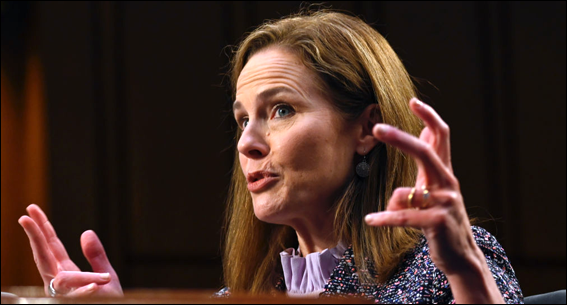This report was written by David Sirota and Andrew Perez

Last week, The Daily Poster broke the news about Judge Amy Coney Barrett’s familial ties to a major oil company involved in a landmark climate case that is suddenly before the Supreme Court. Now, Barrett is explicitly refusing to commit to recusing herself from cases involving oil companies — while depicting widely accepted climate science as “controversial.”
The new statements from Barrett came in response to written questions from Democratic senators, which followed The Daily Poster’s original reporting.
As a lower-court judge, Barrett had previously recused herself from cases involving Shell Oil, because her father worked there as a top attorney for decades. He also served in a top position at the American Petroleum Institute (API), one of the fossil fuel industry’s top lobbying groups, but she never included that organization in her recusal list.
“My Father Worked At Shell Oil Company For Many Years”
In the new questionnaire, Barrett declined to commit to recuse herself from oil company cases if she is appointed to the high court, even though justices just agreed to hear a case involving Shell and other oil companies that are API members.
“My father worked at Shell Oil Company for many years, and while on the Seventh Circuit, in an abundance of caution, I have recused myself from cases involving those Shell entities with which he was involved,” she wrote, in response to a question from Rhode Island Sen. Sheldon Whitehouse (D) about why she recused herself from cases involving Shell entities.
For some reason, Whitehouse did not specifically ask whether Barrett would continue to recuse herself from Shell cases, including the upcoming one, which the Supreme Court agreed to hear only days after Barrett was nominated. In that case, Shell and other fossil fuel giants are asking the court to move climate-related lawsuits out of state court and into federal court, which tend to be friendlier to corporate defendants. If Barrett is confirmed, she could cast a deciding vote on the case, which could decide the fate of all future climate litigation.
The document shows the Rhode Island senator asked Barrett: “Are there any other oil and energy companies that, if a case involving them were to reach the Supreme Court, you would need to recuse yourself from?”
Barrett declined to answer.
“The question of recusal is a threshold question of law that must be addressed in the context of the facts of each case,” she wrote. “As Justice Ginsburg described the process that Supreme Court justices go through in deciding whether to recuse, it involves reading the statute, reviewing precedents, and consulting with colleagues. As a sitting judge and as a judicial nominee, it would not be appropriate for me to offer an opinion on abstract legal issues or hypotheticals. Such questions can only be answered through the judicial process.”
Barrett Says Widely Accepted Climate Science Is A “Controversial Subject”
Barrett was also asked a number of questions about climate change and why she refused to answer questions about climate science during her confirmation hearings — at a moment when the court is dealing with climate-related suits, and climate change threatens to render large swaths of America uninhabitable.
In each written response in the questionnaire, she insisted that her views on climate change are not germane to her job as a judge, despite evidence that Supreme Court justices’ views on climate science can play a pivotal role in their judicial opinions.
After asserting in her confirmation hearings that climate change is “a very contentious matter of public debate,” Barrett again followed the standard script of climate denialists, repeatedly attempting to cast climate science as unsettled and a matter of controversy that she could not offer an opinion on.
In one typical exchange, she was asked: “Do you have any reason to dispute the scientific consensus on human-caused climate change?”
“My views on the subject are not relevant to my job as a judge. If a case comes before me involving environmental regulation, I will carefully review the record and apply the relevant law to the facts before me,” she replied. “Furthermore, the Supreme Court has described ‘climate change’ as a ‘controversial subject’ and ‘sensitive political topic.’... It would be inappropriate for me, as a sitting judge and as a judicial nominee, to opine further on any subject of political controversy.”
Photo credit: Andrew Caballero-Reynolds-Pool / Getty Images
This newsletter relies on readers pitching in to support it. If you like what you just read and want to help expand this kind of journalism, consider becoming a paid subscriber by clicking this link.





